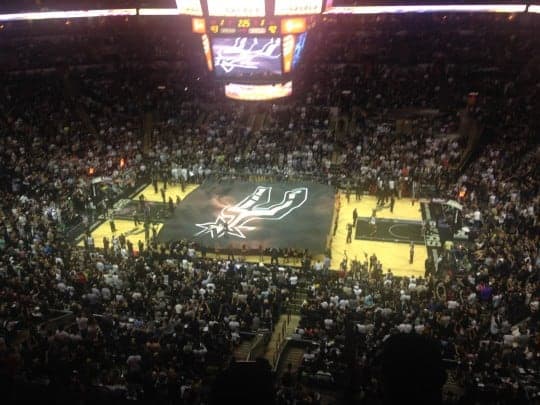Since my wife and I moved to San Antonio just over two years ago, we've become big Spurs fans. Since the Spurs are the only major pro sports team here, it's basically a civic obligation to get behind our local team. The ThedaCare folks and others in Appleton and Green Bay feel that way about their Packers.
This is the Spurs' fifth championship in a run that started in 1999. They've made the playoffs in 26 of the last 27 seasons. That's sustained excellence. And it's fun to watch and cheer for.
The Spurs have some great players, but they play as a team. The Miami Heat and every team the Spurs defeated along the way have great players… but the Spurs are known for being:
- Unselfish
- Classy
- Humble (“That humility starts with Tim Duncan,” said the announcers)
- More concerned about winning the game instead of piling up individual stats
The Spurs' trademark is not flashy dunks — it's passing and playing within a well-defined system. A system. It's a system that incorporates ten players who were born outside of the continental U.S. It's amazing to watch.
Their top teamwork plays of the year:
Their philosophy is to not take a GOOD shot when you can, instead, pass to somebody else to take a GREAT shot.
As I blogged about earlier, Coach Gregg Popovich will remind you of a Lean leader in many ways. In the post-game speech to the team, he called himself “a horse's ass” not just once, but twice. And the players yelled as if to disagree with him.
Hearing this comment during a pre-game interview made me think of Kaizen and continuous improvement:
Boris Diaw: Coach Pop is never satisfied. It's all the details that make the difference. #Lean
— Mark Graban (@MarkGraban) June 16, 2014
Never being satisfied. Paying attention to details. That's Lean thinking. Announcers talked during the game about how the Spurs focused on learning as the season went on. They experimented with different combinations of players to not just win games, but to learn.
The Spurs thought long-term during the season. They had a system and a formula for making sure star players didn't play too many minutes, with the goal of preventing fatigue. They'd worry less about winning a particular game and more about positioning themselves to be healthy and rested for the playoffs… and they accumulated the most wins in the league along the way.
The Spurs talked a lot about how they learned from last year's NBA Finals loss to the Heat… a series they lost in heartbreaking fashion. They didn't go back out there “trying harder” at doing the same things — they adjusted their system. In the post-game press conference, Popovich called MVP Kawhi Leonard “a great learner” among other things.
Even in their loss, I had to be impressed with LeBron James — his individual skill and his leadership. After being beat on a play that led to an easy layup by the Spurs, the Heat called time out and you could read James' lips as he talked to his teammates:
"That's my fault. That's my fault" says @KingJames. Good leadership takes responsibility instead of making excuses or blaming. #GoSpursGo
— Mark Graban (@MarkGraban) June 16, 2014
The Spurs victory, while exciting for San Antonio, shows that skill plus teamwork and leadership can defeat a champion “dream team.” Skill and talent are important, but it's also really important that you work together as a team, within a system, under great leadership.
Here's a picture I took while I was a chance to attend Game 2 of the Finals last Sunday:

The Spurs have their “Big Three” of Tim Duncan, Tony Parker, and Manu Ginobili. But, when 22-year old Kawhi Leonard was named the Finals MVP, you could see how sincerely thrilled his teammates were for him. That's teamwork. That's a champion.
Kawhi Leonard, the 2014 #NBAFinals MVP! pic.twitter.com/7LGfvLpyz8
— NBA (@NBA) June 16, 2014
Go Spurs, Go!
Please scroll down (or click) to post a comment. Connect with me on LinkedIn.
Let’s work together to build a culture of continuous improvement and psychological safety. If you're a leader looking to create lasting change—not just projects—I help organizations:
- Engage people at all levels in sustainable improvement
- Shift from fear of mistakes to learning from them
- Apply Lean thinking in practical, people-centered ways
Interested in coaching or a keynote talk? Let’s start a conversation.




![When Was the Last Time a Leader Around You Admitted They Were Wrong? [Poll]](https://www.leanblog.org/wp-content/uploads/2025/07/Lean-Blog-Post-Cover-Image-2025-07-01T212509.843-238x178.jpg)



![When Was the Last Time a Leader Around You Admitted They Were Wrong? [Poll]](https://www.leanblog.org/wp-content/uploads/2025/07/Lean-Blog-Post-Cover-Image-2025-07-01T212509.843-100x75.jpg)

The WSJ has an article that talks about, in some sports like basketball, having “too many stars” can hurt the team’s performance.
Based on research:
Ref:
“The Too-Much-Talent Effect: Team Interdependence Determines When More Talent Is Too Much or Not Enough,” Roderick I. Swaab, Michael Schaerer, Eric M. Anicich, Richard Ronay and Adam D. Galinsky, Psychological Science (forthcoming)”
Another interesting article from the WSJ asks why more teams don’t copy the Spurs’ formula. Well, it’s a long-term strategy and it’s hard work (just like Lean). It seems easier to just buy a few superstars (much like a hospital might want to just buy new technology to solve their problems).
In part: